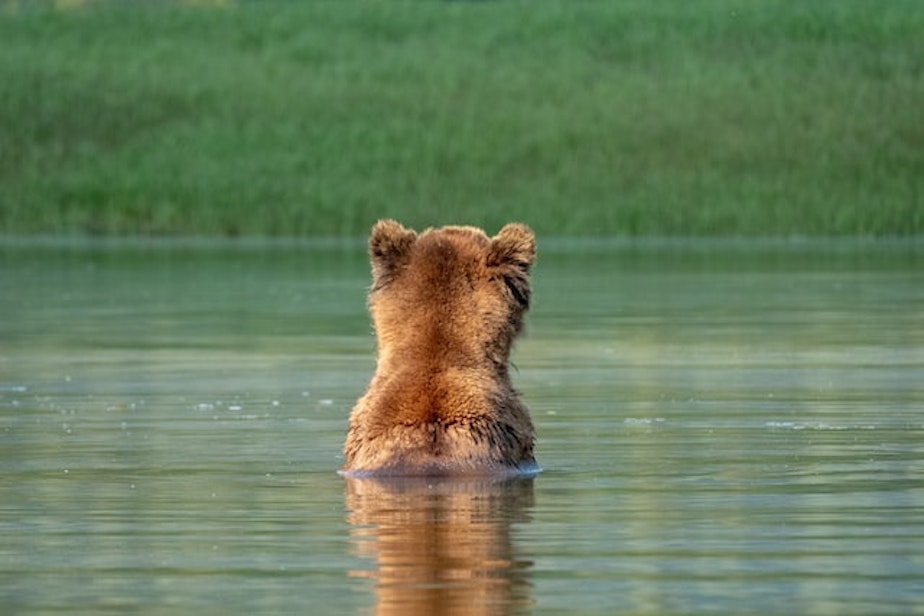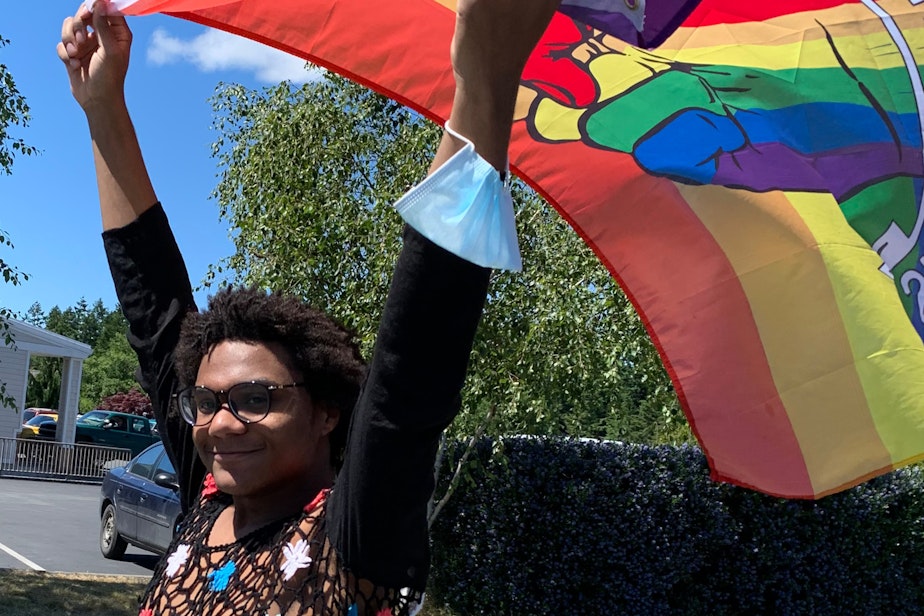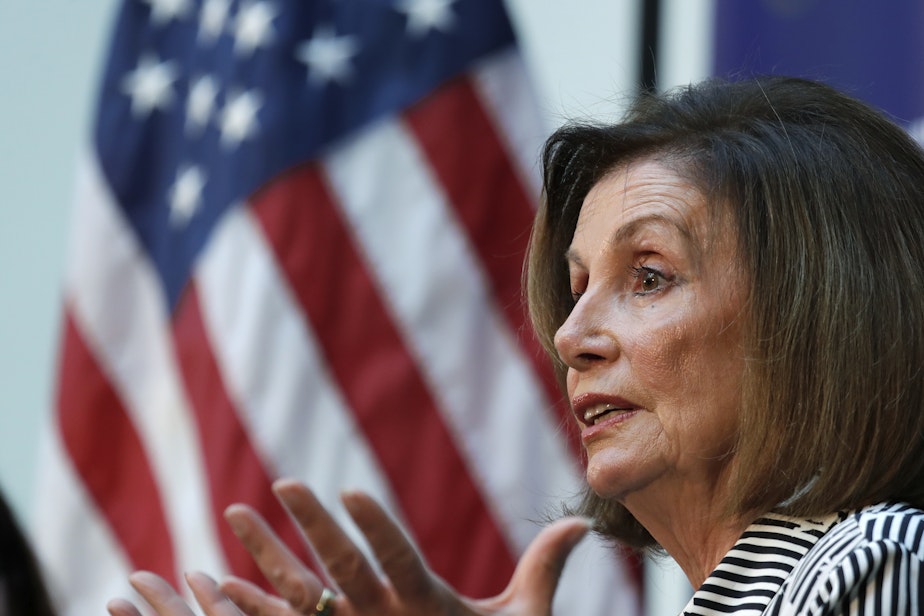A grizzly situation in Washington: Today So Far

- Should we bring grizzly bears back to the North Cascades?
- Washington's DNR is nixing fishy business in Puget Sound.
- When will our dry November end?
This post originally appeared in KUOW's Today So Far newsletter for November 17, 2022.
Once upon a time, there were grizzly bears in Cascade Mountains. Then settlers came, and the grizzlies went away.
That's the end of the story as far as people are concerned, but the story continued for the environment and other animals in the region. Now, there is an effort to start a new chapter for grizzlies in our neck of the woods.
"Essentially, what changed was people arriving," Seattle Times Environmental Reporter Isabella Breda told Seattle Now. "Their value never changed."
Just as with wolves in the Northwest, grizzlies were viewed as a threat to people and livestock. They were hunted for fur, or to just get rid of them. Turns out, they served a purpose for the region's ecosystem. Breda notes that grizzlies turned up the soil as they searched for food, which helped a range of plant species. They ate berries, and in turn, distributed their seeds, such as huckleberries, which are popular with black and white tail deer. Populations exploded among smaller animals that the bears preyed on. The absence of the bears turned the "food chain upside-down," Breda said.
"When the grizzlies left, those processes that the ecosystem relied on them for, left."
Sponsored
In 2014, under the Obama administration, a process was launched to bring the bears back to the North Cascades. That "process" just meant that wildlife officials were going to look into it, but this was all paused under Trump, and now it's being relaunched. The basic idea under consideration is to round up three to five grizzlies from other national parks and bring them to the North Cascades. Then do that every year until you have about 25 bears. Hopefully, the region would have about 200 bears after a century.
Sounds simple enough, until you remember that grizzlies are massive, giant bears and we have all these people in the Cascades now — living there or just driving over for a hike or a camping trip. That brings us back to square one. It's probably why Congressmember Dan Newhouse is pushing back against this idea. Newhouse represents the 4th Congressional District, which spans the North Cascades. In an op-ed, Newhouse argues that reintroducing the bears would "upset our ecosystem and cause undue hardships on agriculture producers, businesses, and families." Newhouse further says that locals have repeatedly shot down this idea, but "outside interest groups and government bureaucrats" who don't have to live with the grizzlies, keep pushing.
A proposal like this is likely to take time. Expect battle lines to be drawn through the North Cascades as this issue moves forward. Check out Breda's full conversation with Seattle Now here.
As one effort to bring animals to one corner of the Northwest begins, another effort is underway to remove another. Washington is nixing all its public waterway leases for fish farms.
You may recall that a fish farm pen near the San Juan Islands broke in 2017, and about 263,000 Atlantic salmon escaped into Puget Sound waters. That was a fish pen off Cypress Island operated by Cooke Aquaculture. The company initially said that far fewer fish escaped, which rubbed state officials the wrong way when the truth was revealed. Relations between the company and the state haven't gotten much better since then. At the time, Cooke was farming Atlantic salmon, which as the name implies, are not native to our Pacific region. As such, they pose certain risks, such as spreading diseases our local salmon have not evolved to handle. The Atlantic salmon that escaped in 2017 reportedly carried a virus which made locals concerned. Beyond all this, local tribes have objected to fish farms and have argued they conflict with treaty rights.
Sponsored
Fast forward to this week — Washington's Department of Natural Resources is not renewing any of its fish farm leases in public waterways. Cooke has four such leases in Puget Sound. It stopped farming Atlantic salmon after the 2017 incident, and has farmed steelhead ever since. Commissioner of Public Lands Hilary Franz said in a statement that the state is "freeing Puget Sound of enclosed cages," and also, “This is a critical step to support our waters, fishermen, tribes, and the native salmon that we are so ferociously fighting to save."
Which brings up a curiosity, which I'll be completely honest, I don't know the answer to. Could fish farms be part of a solution to some environmental woes? I'd really like to hear some thoughts from TSF readers on this. We're already trying to help native salmon populations, and we have salmon hatcheries cranking out new fish into our waters. Industrial farming has its drawbacks when it comes to animals, and fish are far healthier. See where I'm going with this? At least, that's the mental equation that runs through my mind when thinking about all this. Could raising salmon over here help conditions over there? Again, I'd be interested in hearing thoughts from folks who know a thing or two about this topic.
One final note today: The East is taking all our weather ... sort of. OK, it's not really "taking" it.
You might have heard the weather people refer to a "ridge" in their forecasts. There is such a ridge at work right now that has kept our region pretty dry over the past week. In fact, it will go down as one of the driest stretches of November weather in recorded history. Last time something like this happened was in 2000, when we got 13 days of dry weather in November.
This all means that our usual rainy November weather is being sent east.
Sponsored
"A lot of that weather is being deflected into the northern plains states," National Weather Service forecaster Dustin Guy told KUOW. "Basically, the eastern two-thirds of the country is getting the weather we are not ... It just doesn't really want to budge, but eventually it will."
Right now, it's looking like the rain will return in time for Thanksgiving week, probably around Sunday or Monday. Read more details here.
AS SEEN ON KUOW

Have to choose between sexuality and religion? That's a false choice according to Rhea Beecher who has chosen both. "I grew up in a religious environment that made me feel like I wasn’t allowed to be who I truly was. But when I finally started to accept myself, I found people that loved me either way. I felt so relieved and comfortable. I finally found people that helped me connect to Christianity while making me feel safe and loved at the same time." (Courtesy of Liz Krantz)
Sponsored
DID YOU KNOW?
What is a weather "ridge?" You hear that a lot when forecasters are giving weather predictions — a "ridge" is keeping clouds away, or pushing off weather this way or that way.
In short, and in a very basic, non-scientific way, think of a ridge like a wall that is separating other weather patterns. It's when there is an area of high pressure in the atmosphere, compared to the air around it. This high pressure area compresses and warms, and acts like a barrier of sorts. Or at the very least, it influences the direction of weather patterns around it. The opposite of this, with low pressure, is called a "trough." Ridges and troughs aren't fixed and move around as weather patterns do. So just because a ridge is influencing things this week, doesn't mean that the weather won't change next week.
Again, this is a very basic explanation. If you hear the word "ridge" in a forecast, chances are they are implying "nice" weather, aka plenty of sun in that area.
ALSO ON OUR MINDS
Sponsored

Speaker Pelosi says she will step down as party leader after two decades at the top
"With great confidence in our caucus, I will not seek reelection to Democratic leadership in the next Congress. For me the hour has come for a new generation to lead the Democratic caucus that I so deeply respect. I'm grateful that so many are ready and willing to shoulder this awesome responsibility."

